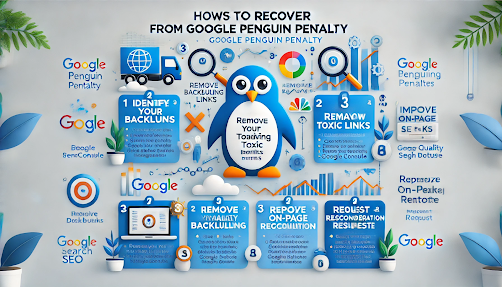Google’s search algorithm is designed to provide users with the most relevant and high-quality content. One of the significant updates aimed at improving search quality is the Google Penguin update. This update focuses on identifying and penalizing websites that use manipulative link-building strategies to improve rankings.
If your website has been affected by a Google Penguin penalty, recovering from it requires a strategic and well-planned approach. Seeking expert assistance can help ensure a thorough recovery process while aligning your site with Google's guidelines.
In this guide, we will explore:
What Google Penguin penalties are
Why websites get penalized
The impact of these penalties
Steps to recover effectively
The benefits of professional SEO assistance
By following a methodical approach, website owners can regain lost rankings and maintain a healthy backlink profile for long-term success.
Understanding Google Penguin Penalties
What is the Google Penguin Update?
The Google Penguin update, introduced in 2012, targets websites with unnatural link profiles. It aims to reduce spammy link-building tactics and promote organic, high-quality backlinks. The primary goal is to encourage ethical SEO practices that improve the user experience.
Why Does Google Penalize Websites?
Google aims to provide search results that are trustworthy, relevant, and useful. To achieve this, it discourages manipulative SEO practices, such as:
Paid links: Buying backlinks to artificially inflate rankings.
Link farms: Generating links from low-quality sites with no real content.
Over-optimized anchor texts: Using exact-match keywords excessively in backlinks.
Private blog networks (PBNs): Creating multiple sites solely to link back to a primary domain.
If a site is found engaging in these practices, Google may apply a Penguin penalty, leading to ranking drops or complete deindexing from search results.
How Do Penguin Penalties Affect Websites?
A Google Penguin penalty can significantly impact a website’s visibility, traffic, and revenue. The effects include:
Lower search rankings: Keyword rankings drop, making it harder for users to find the site.
Decline in organic traffic: Fewer visitors reach the site through search engines.
Loss of credibility: Google prioritizes sites with high-quality backlinks and natural link-building efforts.
Long-term recovery challenges: Restoring rankings requires extensive cleanup and strategic SEO efforts.
Because of these consequences, recovering from a Penguin penalty quickly and effectively is essential.
Steps to Recover from Google Penguin Penalties
Recovering from a Google Penguin penalty involves identifying and removing bad backlinks, improving on-page SEO, and adopting ethical link-building strategies.
1. Conduct a Comprehensive Backlink Audit
A thorough backlink audit helps identify low-quality or spammy links contributing to the penalty. Tools like Google Search Console, Ahrefs, and SEMrush can analyze backlink profiles to find problematic links.
Key aspects to evaluate:
Irrelevant backlinks from unrelated websites
Over-optimized anchor text appearing unnaturally across multiple domains
Spammy or low-quality websites linking to your domain
Once identified, these links need to be addressed.
2. Remove Harmful Backlinks
The next step involves removing or disavowing toxic backlinks. Website owners can:
Contact webmasters and request removal of unnatural links
Use Google’s Disavow Tool to tell search engines to ignore specific backlinks
Ensure that new links come from authoritative and relevant sources
Taking these actions helps clean up the backlink profile, reducing the impact of the penalty.
3. Optimize Anchor Text Distribution
A natural anchor text profile is essential for maintaining a balanced and penalty-free link-building strategy. To optimize anchor text:
Avoid using exact-match keywords excessively
Incorporate a mix of branded, generic, and long-tail anchor texts
Ensure that anchor texts appear contextually relevant within content
This ensures a diverse and organic link profile that aligns with Google’s best practices.
4. Improve On-Page SEO Elements
On-page SEO plays a crucial role in maintaining site credibility and boosting rankings after penalty recovery. Consider the following best practices:
Optimize content quality: Ensure that pages provide useful and engaging information.
Improve internal linking: Establish a logical structure for better navigation and relevance.
Enhance page load speed: A faster website improves user experience and search performance.
Fix broken links: Ensure that all links point to active, authoritative pages.
These improvements help rebuild the site’s authority while reinforcing Google-compliant SEO practices.
5. Develop a White-Hat Link-Building Strategy
Once the site is free of harmful links, the focus should shift to earning high-quality backlinks through ethical methods.
Effective white-hat strategies include:
Guest posting on reputable websites
Earning backlinks from industry leaders
Creating shareable, high-quality content
Building relationships with influencers and bloggers
These strategies ensure long-term stability and reduce the risk of future penalties.
The Role of SEO Experts in Penguin Recovery
Recovering from a Google Penguin penalty can be complex and time-consuming. SEO professionals bring the necessary expertise to ensure a smooth recovery process.
Why Work with SEO Experts?
1. In-Depth Backlink Analysis
SEO experts use advanced tools to assess link quality and detect harmful backlinks that may be difficult to identify manually.
2. Effective Link Removal Strategies
Professionals have experience in outreach and disavowal processes, ensuring that toxic links are addressed efficiently.
3. Compliance with Google Guidelines
SEO specialists ensure that all recovery actions align with Google’s Webmaster Guidelines, preventing further penalties.
4. Long-Term SEO Strategy Development
Beyond penalty recovery, experts develop sustainable SEO strategies to enhance search rankings and website authority.
Preventing Future Google Penguin Penalties
To avoid future penalties, website owners should adopt sustainable SEO practices and continuously monitor their backlink profiles.
Key Preventative Measures:
Regular backlink audits to identify and remove spammy links
Focus on quality over quantity when acquiring backlinks
Diversify anchor texts for a natural linking profile
Follow Google’s SEO guidelines to stay compliant with search algorithms
By maintaining a clean and natural backlink profile, websites can protect their rankings while improving long-term search performance.
Conclusion
Recovering from a Google Penguin penalty requires a strategic approach that includes backlink cleanup, on-page SEO improvements, and ethical link-building. While the process can be complex, expert SEO assistance ensures a thorough and effective recovery.
By implementing white-hat SEO practices and following Google’s guidelines, websites can achieve sustainable growth and long-term success in search rankings.


Comments
Post a Comment